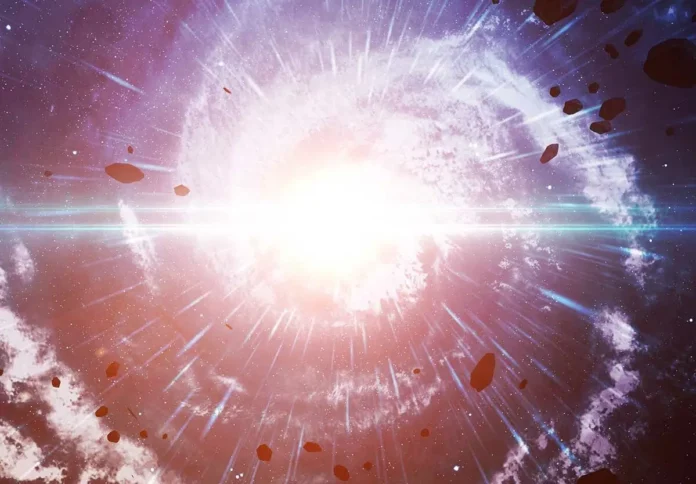Introduction
The Big Bang Theory is a scientific model that provides an explanation for the origin and evolution of the universe. It proposes that the universe began as a singularity—a point of infinite density and temperature—and has been expanding ever since. This article explores the key concepts and evidence supporting the Big Bang Theory, its implications for our understanding of the cosmos, and some common misconceptions surrounding this fascinating scientific theory.
The Basics of the Big Bang Theory
The Singularity and Cosmic Expansion
According to the Big Bang Theory, the universe originated approximately 13.8 billion years ago from a singularity—a state of extreme density and temperature. At this point, all matter, energy, space, and time were compressed into a single point. Then, in an event known as the Big Bang, the singularity rapidly expanded, giving rise to the universe as we know it.
Cosmic Microwave Background Radiation
One of the key pieces of evidence supporting the Big Bang Theory is the existence of cosmic microwave background radiation (CMB). The CMB is a faint, uniform radiation that permeates the entire universe. It is the remnant of the intense heat that filled the early universe shortly after the Big Bang. The discovery of the CMB in 1965 by Arno Penzias and Robert Wilson provided strong evidence in favor of the Big Bang Theory.
Redshift and the Expanding Universe
Another crucial observation supporting the Big Bang Theory is the redshift of light from distant galaxies. When light from an object in space moves away from an observer, its wavelength stretches, causing a shift toward the red end of the electromagnetic spectrum. This redshift indicates that galaxies are moving away from us, providing evidence for an expanding universe consistent with the predictions of the Big Bang Theory.
Formation of Elements and Cosmic Evolution
As the universe expanded and cooled down after the Big Bang, subatomic particles formed atoms, and atoms eventually combined to form elements. The process of nucleosynthesis—primarily occurring in the early universe and within stars—led to the formation of elements such as hydrogen, helium, and trace amounts of other light elements. This element formation and subsequent stellar evolution laid the foundation for the development of galaxies, stars, and planets over billions of years.
Common Misconceptions about the Big Bang Theory
The Big Bang was an Explosion in Space
Contrary to popular belief, the Big Bang was not an explosion that occurred within a pre-existing space. Instead, it was the rapid expansion of space itself, carrying matter and energy with it. The analogy of a balloon expanding can help visualize this concept: as the balloon inflates, all points on its surface move away from each other, much like the galaxies in our expanding universe.
The Big Bang Theory Explains the Origin of Life
While the Big Bang Theory provides insights into the origin and evolution of the universe, it does not specifically address the origin of life itself. The study of the origins of life falls within the domain of abiogenesis and the field of astrobiology, which explore how life emerged from non-living matter on Earth and the potential for life elsewhere in the universe.
The Big Bang Violates the Laws of Conservation of Matter and Energy
Some misconceptions suggest that the Big Bang Theory violates the laws of conservation of matter and energy because it proposes that the universe emerged from nothing. However, the Big Bang Theory does not seek to explain the ultimate origin of matter and energy. Rather, it describes the expansion and evolution of the universe from an incredibly dense and hot state.
Frequently Asked Questions (FAQs)
1. What caused the Big Bang?
The cause or origin of the Big Bang remains a subject of scientific investigation. The current understanding is that the laws of physics, as we know them, break down at the singularity, making it difficult to determine the exact cause of the Big Bang. However, ongoing research and theoretical models seek to shed light on this fundamental question.
2. Is the Big Bang Theory widely accepted in the scientific community?
Yes, the Big Bang Theory is widely accepted by the scientific community as the prevailing explanation for the origin and evolution of the universe. It is supported by a wealth of observational evidence, including the cosmic microwave background radiation, the redshift of distant galaxies, and the abundance of light elements.
3. What came before the Big Bang?
The concept of “before” the Big Bang is not well-defined within the framework of the theory itself. Since the singularity marks the beginning of space and time as we know them, the notion of time “before” the Big Bang loses its meaning. The nature of what may have existed or occurred prior to the singularity is still an open question in cosmology.
4. Are there any alternative theories to the Big Bang?
Several alternative theories to the Big Bang have been proposed, such as the Steady State theory and the Oscillating Universe theory. However, these alternatives have not garnered the same level of observational support as the Big Bang Theory. The Big Bang remains the most widely accepted and supported explanation for the origins of the universe.
Conclusion
The Big Bang Theory stands as one of the most influential scientific theories of our time, providing a comprehensive framework for understanding the origins and evolution of the universe. Supported by evidence such as cosmic microwave background radiation, redshift observations, and the formation of elements, the Big Bang Theory has shaped our understanding of the cosmos and our place within it. While misconceptions may arise, it is important to recognize that the Big Bang Theory does not address the origin of life itself nor violate the laws of conservation of matter and energy. As scientists continue to explore the mysteries of the universe, the Big Bang Theory remains a cornerstone in our quest to unravel the profound mysteries of existence.
===========================================


